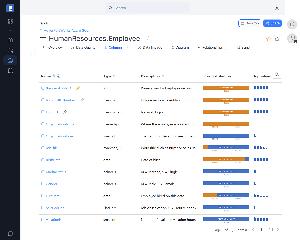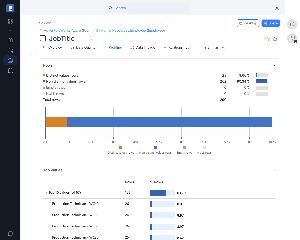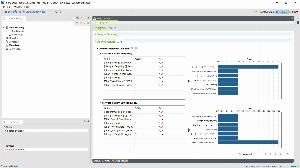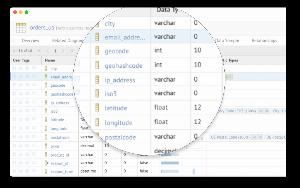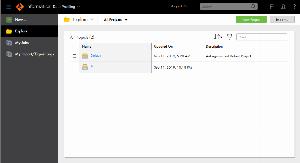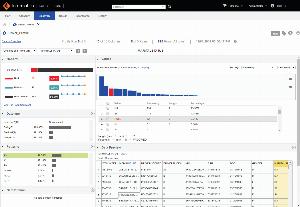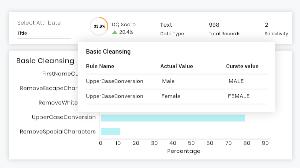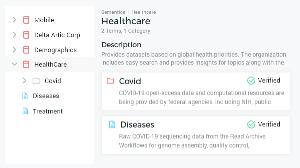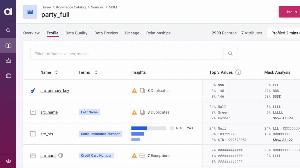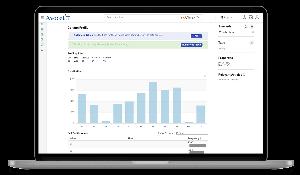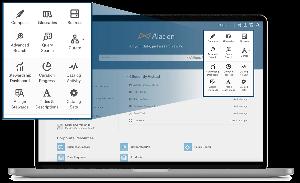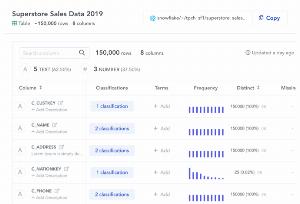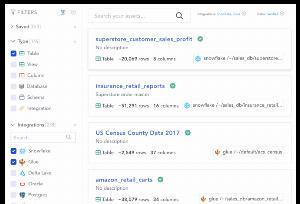Data profiling tools for Qlik Sense
Data Profiling tools allow analyzing, monitoring, and reviewing data from existing databases in order to provide critical insights. Data profiling can help organizations improve data quality and decision-making process by identifying problems and addressing them before they arise.
Dataedo
Dataedo is a data governance platform with a data profiling feature. It allows you to use sample data to learn what data is stored in your data assets. You can browse min, max, average and median values, see top values, as well as value and row distribution to understand the data better before using it.
| Access control: |
|
|---|---|
| Commercial: | Commercial |
| Desktop/Cloud: | Desktop |
| Excel workbooks: |
|
| Flat files: |
|
| Free edition: |
|
| Metadata identification: |
|
| NoSQL sources: |
|
| Runs on: (for desktop): | Windows |
| Sensitive data discovery: |
|
| SQL sources: |
|
| Statistics of data: | Avg,Max,Min,Stdev |
| Tagging data: | - |
Talend Data Fabric
Talend Data Fabric combines data integration, integrity, and governance in a single, unified platform. Talend Data Fabric's capabilities allow you to extract, process, and profile data from virtually any source to your data warehouse. Data profiling lets you quickly identify data quality issues, discover hidden patterns, and spot anomalies through summary statistics and graphical representations.
| Access control: |
|
|---|---|
| Commercial: | Commercial |
| Desktop/Cloud: | Desktop |
| Excel workbooks: |
|
| Flat files: |
|
| Free edition: |
|
| Metadata identification: |
|
| NoSQL sources: |
|
| Runs on: (for desktop): | Mac OS,Windows |
| Sensitive data discovery: |
|
| SQL sources: |
|
| Statistics of data: | - |
| Tagging data: |
|
Informatica Data Profiling
Informatica’s data profiling solution, Data Explorer, is available in two editions—Standard and Advanced—that employ powerful data profiling capabilities to scan every single data record, from any source, to find anomalies and hidden relationships. It works regardless of complexity or of the relationship between your data sources.
| Access control: |
|
|---|---|
| Commercial: | Commercial |
| Desktop/Cloud: | Cloud |
| Excel workbooks: |
|
| Flat files: |
|
| Free edition: |
|
| Metadata identification: |
|
| NoSQL sources: |
|
| Runs on: (for desktop): | - |
| Sensitive data discovery: |
|
| SQL sources: |
|
| Statistics of data: | Avg,Max,Min,Stdev |
| Tagging data: |
|
DQLabs
DQLabs platform has a data profiling platform that is AI-driven and accepts data from multiple sources in different formats if necessary. The user interface is user-friendly and will allow the user to track the data profiling process and make adjustments where they feel it’s necessary. The platform algorithms will detect deep insight into the source data and increase the quality of the profiled data.
| Access control: |
|
|---|---|
| Commercial: | Commercial |
| Desktop/Cloud: | Cloud |
| Excel workbooks: |
|
| Flat files: |
|
| Free edition: |
|
| Metadata identification: |
|
| NoSQL sources: |
|
| Runs on: (for desktop): | - |
| Sensitive data discovery: |
|
| SQL sources: |
|
| Statistics of data: | - |
| Tagging data: |
|
Ataccama ONE
Ataccama One lets you discover, analyze, understand critical patterns in your data. You can see data domains and data quality highlights for each attribute. Re-profile data in one click and check whether the problems you identified were fixed. You can select as many tables in a data source as you need and profile them all in one click.
| Access control: |
|
|---|---|
| Commercial: | Commercial |
| Desktop/Cloud: | Desktop |
| Excel workbooks: |
|
| Flat files: |
|
| Free edition: |
|
| Metadata identification: |
|
| NoSQL sources: |
|
| Runs on: (for desktop): | Windows |
| Sensitive data discovery: |
|
| SQL sources: |
|
| Statistics of data: | - |
| Tagging data: |
|
Alation Data Catalog
Alation’s data profiling capabilities help reduce the time spent in the data exploration phase. With Alation’s data profile, data consumers have the metrics they need to easily discern the quality of any data object. Alation displays important characteristics, statistics, and numerical graphs about the data — enabling data scientists and data engineers to quickly take action. The data profiling now also includes new charts and customizations.
| Access control: |
|
|---|---|
| Commercial: | Commercial |
| Desktop/Cloud: | Cloud |
| Excel workbooks: |
|
| Flat files: |
|
| Free edition: |
|
| Metadata identification: |
|
| NoSQL sources: |
|
| Runs on: (for desktop): | - |
| Sensitive data discovery: |
|
| SQL sources: |
|
| Statistics of data: | - |
| Tagging data: |
|
Atlan
Atlan automatically profiles your data to identify missing values, outliers & other data anomalies. Data profiles are fully configurable, and admins can schedule data profile updates, run profiles on random/stratified samples or custom filters. Atlan's data profile is an open ecosystem, allowing teams to import data quality metrics from external ecosystems like data pipeline tools for key metrics, such as timeliness, or other internal tools or frameworks.
| Access control: |
|
|---|---|
| Commercial: | Commercial |
| Desktop/Cloud: | Cloud |
| Excel workbooks: |
|
| Flat files: |
|
| Free edition: |
|
| Metadata identification: |
|
| NoSQL sources: |
|
| Runs on: (for desktop): | - |
| Sensitive data discovery: |
|
| SQL sources: |
|
| Statistics of data: | Avg,Stdev |
| Tagging data: |
|
The use of data profiling tools can lead to higher-quality, more reliable data or eliminating errors that add costs to data-driven projects. Eliminating these costly errors involve processes such as:
• Collecting descriptive statistics.
• Collecting data types, length and recurring patterns.
• Tagging data with keywords, descriptions or categories.
• Performing data quality assessment.
• Discovering metadata and assessing its accuracy.
The most efficient way of handling the data profiling process is to automate it with a data management solution. We prepared a list of open-source data profiling tools that help you carry out the analysis of your data and identify the issues.
 SQL Server
SQL Server
 Oracle
Oracle
 MySQL
MySQL
 PostgreSQL
PostgreSQL
 Amazon Redshift
Amazon Redshift
 Azure SQL Database
Azure SQL Database
 DBT
DBT
 Google Big Query
Google Big Query
 IBM DB2
IBM DB2
 MariaDB
MariaDB
 SAP HANA
SAP HANA
 Snowflake
Snowflake
 SQLite
SQLite
 Teradata
Teradata
 Vertica
Vertica
